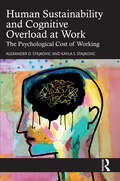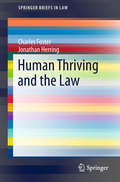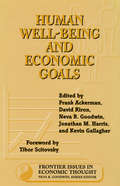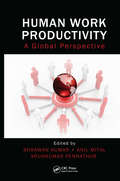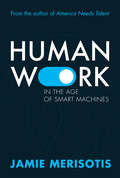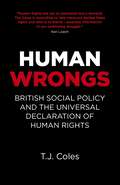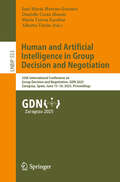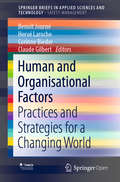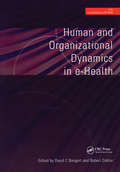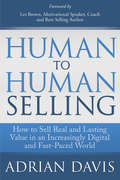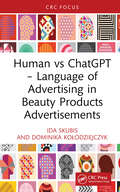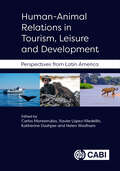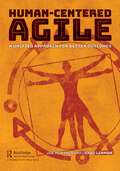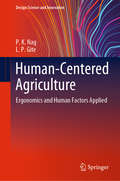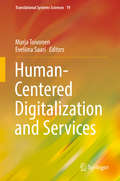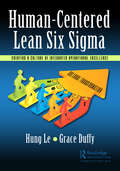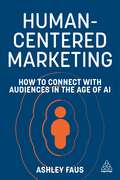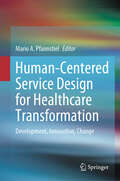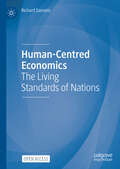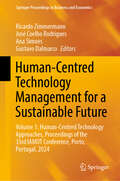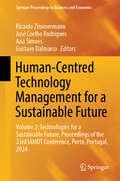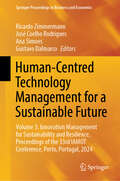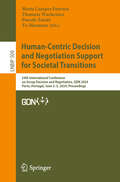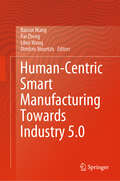- Table View
- List View
Human Sustainability and Cognitive Overload at Work: The Psychological Cost of Working
by Alexander D. Stajkovic Kayla S. StajkovicThis innovative book considers the cost of cognitive overload and psychological distress on human sustainability, and suggests ways to prevent employees from becoming a psychologically depleted workforce.Employee attentional processing capacity is maxed out, and psychological distress is at an all-time high. Alexander D. Stajkovic and Kayla S. Stajkovic explain how human cognitive ‘broadband’ is at the hunter-gatherer level and changes at an evolutionary snail’s pace. Yet the amount of information necessary to make a living now is incomparable to then, and the current relationship between workers and organizations is unsustainable. The authors discuss causes, processes, and consequences of human unsustainability at work, as well as suggesting remedies for personal change, leadership practice, and policy development. They frame efforts toward furthering human sustainability as a grand challenge that tackles a chronic problem at a societal level with consequences that have ripple effects into other spheres of life. Drawing from multiple disciplines and data sources, the book offers a theory-driven, evidence-based, and meaningful way to better understanding employee cognitive overload and psychological distress in organizations across the globe, and improve work lives going forward.Human Sustainability and Cognitive Overload at Work is a useful resource for students and scholars of business, management, leadership, organizational and work psychology, and organizational studies. The practical insights will also help managers, policy makers, policy analysists, consultants, and all those with an interest in the psychological cost of working.The Open Access version of this book, available at www.taylorfrancis.com, has been made available under a Creative Commons Attribution-Non Commercial-No Derivatives (CC-BY-NC-ND) 4.0 license.
Human Thriving and the Law (SpringerBriefs in Law)
by Charles Foster Jonathan HerringThe idea of the Good Life – of what constitutes human thriving, is, implicitly, the foundation and justification of the law. The law exists to hold societies together; to hold in tension the rights of individuals as against individuals, the rights of individuals as against various types of non-humans such as corporations (and vice versa), and the rights of individuals individuals as against the state (and vice versa). In democratic states, laws inhibit some freedoms in the name of greater, or more desirable freedoms. The only justification for law is surely that it tends to promote human thriving. But what is the Good Life? What does it mean to live a thriving life? There has been no want of discussion, at least since the great Athenians. But surprisingly, since human thriving is its sole raison d’etre, the law has been slow to contribute to the conversation. This book aims to start and facilitate this conversation. It aims to: -make lawyers ask: ‘What is the law for?’, and conclude that it is to maximise human thriving -make lawyers ask: ‘But what does human thriving mean?’ -make judges and advocates ask: ‘How can a judgment about the best interests of a patient be satisfactory unless its basis is made clear?’
Human Well-Being and Economic Goals (Frontier Issues in Economic Thought #3)
by Kevin Gallagher Jonathan Harris Neva R. Goodwin David Kiron Frank Ackerman Kenneth ArrowWhat are the ends of economic activity? According to neoclassical theory, efficient interaction of the profit-maximizing "ideal producer" and the utility-maximizing "ideal consumer" will eventually lead to some sort of social optimum. But is that social optimum the same as human well-being? Human Well-Being and Economic Goals addresses that issue, considering such questions as: *Does the maximization of individual welfare really lead to social welfare? *How can we deal with questions of relative welfare and of equity? *How do we define, or at least understand, individual and social welfare? *And how can these things be measured, or even assessed? Human Well-Being and Economic Goals brings together more than 75 concise summaries of the most significant literature in the field that consider issues of present and future individual and social welfare, national development, consumption, and equity. Like its predecessors in the Frontier Issues in Economic Thought series, it takes a multidisciplinary approach to economic concerns, examining their sociological, philosophical, and psychological aspects and implications as well as their economic underpinnings. Human Well-Being and Economic Goals provides a powerful introduction to the current and historical writings that examine the concept of human well-being in ways that can help us to set goals for economic activity and judge its success. It is a valuable summary and overview for students, economists, and social scientists concerned with these issues.
Human Work Productivity: A Global Perspective
by Arunkumar Pennathur Anil Mital Shrawan KumarThe current global economic downturn and considerable shifting in industrial and manufacturing activities have disturbed the industrial order. However, human work productivity is still one of the most important components of the industrial economy and a determining factor in global competiveness and influence as well as the potential for technologi
Human Work in the Age of Smart Machines
by Jamie MerisotisA public policy leader addresses how artificial intelligence is transforming the future of labor—and what we can do to protect the role of workers. As computer technology advances with dizzying speed, human workers face an ever-increasing threat of obsolescence. In Human Work In the Age of Smart Machines, Jamie Merisotis argues that we can—and must—rise to this challenge by preparing to work alongside smart machines doing that which only humans can: thinking critically, reasoning ethically, interacting interpersonally, and serving others with empathy. The president and CEO of Lumina Foundation, Merisotis offers a roadmap for the large-scale, radical changes we must make in order to find abundant and meaningful work for ourselves in the 21st century. His vision centers on developing our unique capabilities as humans through learning opportunities that deliver fair results and offer a broad range of credentials. By challenging long-held assumptions and expanding our concept of work, Merisotis argues that we can harness the population&’s potential, encourage a deeper sense of community, and erase a centuries-long system of inequality.
Human Wrongs: British Social Policy and the Universal Declaration of Human Rights
by T. J. ColesA devastating analysis of modern Britain. Britain is a forward-thinking, human-rights protecting beacon of democracy, right? Think again! Written in time for the 70th anniversary of the Universal Declaration of Human Rights, this book is a documented exposé of Britain's domestic human rights abuses under successive governments from the year 2000 to the present. It covers the deaths of the 20,000 pensioners a year who can't afford heating, the 40,000 people who succumb to air pollution each year, the limits on freedom of speech (including libel law), mass surveillance of Britons by the deep state, and much, much more. By comparing Britain to other rich countries on issues as diverse as infant mortality, child wellbeing, ethnic rights, and union membership, Human Wrongs reveals just how anti-human the British system really is for people of a certain class, gender, disability and/or ethnicity.
Human and Artificial Intelligence in Group Decision and Negotiation: 25th International Conference on Group Decision and Negotiation, GDN 2025, Zaragoza, Spain, June 15–18, 2025, Proceedings (Lecture Notes in Business Information Processing #553)
by Danielle Costa Morais José María Moreno-Jiménez María Teresa Escobar Alberto TurónThis book constitutes the refereed proceedings of the 25th International Conference on Group Decision and Negotiation, GDN 2025, which took place in Zaragoza, Spain, during June 2025. The field of Group Decision and Negotiation focuses on decision processes with at least two participants and a common goal but conflicting individual goals. Research areas of Group Decision and Negotiation include electronic negotiations, experiments, the role of emotions in group decision and negotiations, preference elicitation and decision support for group decisions and negotiations, and conflict resolution principles. The 12 full papers included in these proceedings were carefully reviewed and selected from 99 submissions. They were organized in topical sections as follows: AI, Ethics, and Societal Impact in Group Decision and Negotiation; Preference Modeling, Evaluation, and Decision Support in Group Contexts; and Conflict Modeling in Complex Decision Environments.
Human and Organisational Factors: Practices and Strategies for a Changing World (SpringerBriefs in Applied Sciences and Technology)
by Corinne Bieder Claude Gilbert Benoît Journé Hervé LarocheThis open access book addresses several questions regarding the implementation of human and organisational factors (HOF) so that recent improvements in industrial safety can be built upon. It addresses sources of frustration in senior management with high expectations of operational recommendations and disquiet on the part of HOF specialists struggling to have an impact on high-level decision making. The brief explores these issues with an emphasis on examples and lessons learned based on the experience of its authors, who come from different academic disciplines and various industrial sectors such as oil and gas, energy and transportation. It then offers some ways forward for a better consideration of HOF in hazardous companies with a view of promoting safety and facing challenges in a rapidly changing world.
Human and Organizational Dynamics in E-Health
by David Bangert Robert DoktorNurses are key to building effective teams in primary care, but it has proved difficult to develop 'teams' in a service based on a small-business model. Current organisational arrangements fragment the different clinical professionals into tribes who have different employers and managers. This book brings together the work of pioneers in the field, to provide models for the future. As the need to define the primary care team becomes more urgent, this book is essential reading for all nursing professionals in primary care, nursing management, general practitioners, and primary care leaders at health authorities and Primary Care Organisations. 'The authors present an understanding of the context within which change is taking place, the elements to be addressed in the change process and a challenge for the future direction and pace of change.' From the Foreword by Marion Bull, Chief Nursing Officer, Welsh Office
Human and Water Security in Israel and Jordan
by Philip Jan SchäferThe work aims at answering the question as to how far discourses on human security are present in Jordan and Israel, if they converge and if political solutions for the issue of water security could be derived. The analysis is based on the assumption that from human security perspective common solutions for urgent problems can be derived more easily than out of a perspective of national security. Yet it is acknowledged that according to a new security perspective different security threats are being identified by relevant actors. An empirical analysis of written statements and utterances of the respective security elites establishes the methodological tool for the identification of human security discourses in Israel and Jordan. Subsequently it is estimated how far water is presented as a matter of national security in Israel and Jordan using the theory of securitization.
Human to Human Selling: How to Sell Real and Lasting Value in an Increasingly Digital and Fast-Paced World
by Adrian DavisIn our increasingly digitized and fast-paced world, human relationships are often strained—sales relationships even more so. Today’s buyers are better informed, more sophisticated, and more transactional. As a result, sales professionals must navigate new challenges as they seek to develop meaningful relationships with these sometimes elusive buyers. In Human To Human Selling, sales strategist Adrian Davis details how sales professionals and the people who manage them can increase sales performance while developing strategic relationships with their customers. Bringing sales professionals out of the Industrial Age adversarial model of sales into the “Age of Business Reformation,” Human To Human Selling presents a step-by-step process for building symbiotic relationships with buyers—connections that are both mutually rewarding and emotionally fulfilling and lead to the “right-fit” customer. Human To Human Selling
Human vs ChatGPT – Language of Advertising in Beauty Products Advertisements
by Ida Skubis Dominika KołodziejczykThis book systematically investigates the linguistic strategies employed in beauty product advertising to assess their persuasive and manipulative effects. The work is divided into two sections: a review of relevant literature and an empirical analysis of advertisements. The analysis initially focuses on the linguistic features of advertisements created by humans prior to the introduction of ChatGPT, examining the linguistic measures used and their methods of persuasion and manipulation. Subsequent sections provide a detailed examination of advertisements generated by ChatGPT versions 3.5 and 4.0, analysing the artificial intelligence’s use of linguistic techniques. This includes a meta-analysis where ChatGPT itself discusses the linguistic strategies it employs. The ultimate goal is to compare and contrast the effectiveness and linguistic devices used in advertisements crafted by humans and those by ChatGPT, analysing how AI influences the language of advertising and its impact on consumer behaviour.
Human-Animal Relations in Tourism, Leisure and Development: Perspectives from Latin America
by Katherine Dashper Carlos Monterrubio Xavier López-Medellín Helen WadhamHumans and animals have developed multiple and complex interactions in the fields of tourism, leisure, and development. However, much of the existing research on how humans and animals interact in these fields has emerged from within the context of developed countries. As a result, little has been documented about human-animal interactions in the socioeconomic, cultural, and environmental contexts of countries in the Global South. Specifically, the diversity and complexity of interspecies relationships in tourism, leisure, and local development in Latin America have been largely ignored in Anglo-Saxon literature. This has resulted in a limited, partial, and hegemonic understanding and debate about human-animal relationships globally, dominated by certain regions of the world. This book addresses this gap by documenting multiple and complex relationships between humans and animals in the fields of tourism, leisure, and local development in countries in Latin America. The book: Brings together empirical and conceptual works that reveal different disciplinary, theoretical, ethical, methodological, and practical perspectives. Reveals how human-animal relationships - both domestic and wild - can result in co-created interspecies experiences, conflicts, conservation efforts, welfare, and local development of human societies in the region. Equips stakeholders with conceptual frameworks and actionable tools to formulate policies that blend animal welfare and sustainability in Latin American tourism and recreation strategies. Challenges dominant narratives from the Global North regarding tourism and conservation, promoting a more inclusive and nuanced approach. This book will be of interest to researchers, professionals and policymakers within tourism, leisure, animal welfare, conservation and destination development.
Human-Centered Agile: A Unified Approach for Better Outcomes
by Joe Montalbano Brad LehmanThis book is a guide on how to apply Human-Centered Design (HCD) practices to an Agile product development model that is used widely throughout industry and government, where it is applied primarily to software and technology development efforts. This has been an ongoing industry challenge due to the fact that HCD prioritizes time spent understanding the problems to be solved (time spent in the problem space), while Agile prioritizes a fast hypothesize-and-deliver model (time spent in the solution space). Organizations that attempt an Agile transformation abandon it either because it was too difficult or because it did not deliver the hoped-for results. At the same time, efforts to improve the design and experience of their products using Human-Centered Design have a tendency to fall short because it can be difficult to see the ROI of design efforts, even while companies like McKinsey document design-driven successes. What’s more, a company that successfully adopts Agile often seems to have an even harder time implementing HCD and vice versa. This is particularly disappointing since Agile and HCD should be mutually supportive. In practice, Agile teams often bypass HCD efforts in favor of finishing their goals and thinking they are doing well, only to have their work product fail to meet the actual end user’s needs. At first the team will become indignant. “We followed the expert guidance of our Product Owner, the ‘Voice of the Customer,’” they will say, followed by “but… it met all of the Acceptance Criteria, they should love it.” It’s a failure of Agile that this type of sub-optimal delivery happens so regularly and predictably. The fact that team responses can be so accurately predicted in advance (by those who’ve seen this movie many times before) point to a process failure or inefficiency that is widespread and desperately needs to be addressed. Alternatively, teams will invest too heavily in up-front discovery efforts that slow down delivery to an unacceptable point, often while also failing to capture research-based findings in a way that matures the overall strategic product or portfolio understanding. The cost of misfiring goes far beyond a bad delivery or an angry customer. Decreased team morale drives poorer future performance (cost), turnover if left unchecked (more cost), and non-productive blame sessions that lead to degraded faith in the Agile product development model itself. This book identifies solutions based on successful methods of integrating HCD practices by phase into an ongoing agile delivery model, from the discovery through implementation and evaluation, including: key success factors for an HCD/Agile engagement approach, critical points of delivery, and strategies for integrating HCD into teams based on the existing design maturity of an organization or product team.
Human-Centered Agriculture: Ergonomics and Human Factors Applied (Design Science and Innovation)
by P. K. Nag L. P. GiteThis book explores the interplay of farm mechanization, human factors and climatic and other environmental uncertainty in agriculture, using an ergonomics based approach to discuss solutions to the traditionally acknowledged vulnerability of the sector. It converges contemporary research documentation, case studies and international standards on agricultural ergonomics, engineering anthropometry, human factors, basic occupational health services, safety management, human performance and system sustainability to provide a handy reference to students and professionals working to optimize agricultural output while balancing the rational utilization of labour in agricultural practices and human well-being.
Human-Centered Digitalization and Services (Translational Systems Sciences #19)
by Marja Toivonen Eveliina SaariThis book provides a timely overview of the impacts of digitalization from the perspective of everyday life, and argues that one central issue in digitalization is the development of new types of services that digitalization enables, but which are often overlooked due to the focus on new technologies and devices. The book summarizes the past 20 years of research into the relationship between information and communications technology (ICT) and service innovation, and reveals that the ongoing digitalization is a qualitatively different phenomenon and represents a true paradigm shift.The all-encompassing integration and distribution of data raises critical issues such as preserving human dignity and individual autonomy; moreover, interaction practices that foster broad participation, trust, learning, and a willingness to share knowledge are called for. Citizen empowerment and multi-actor co-creation have become central to using digitalization to support the development of wellbeing and sustainability.Further, the book shows how employees and professionals can and should be involved in designing their future work, and in evaluating it. Proactiveness and participation in innovation endeavours are ways to guarantee meaningful work in an age of socio-technical transition.The book employs a variety of theoretical approaches and perspectives from diverse disciplines to illustrate these needs. In addition to theoretical analyses, some specific application areas are examined, e.g. services in health and social care, and problems linked to robots in elderly care. Given its scope, the book is highly recommended to all readers seeking an overview of the current understanding of the human side of digitalization and searching for concrete cases from different countries to illustrate the topic.
Human-Centered Lean Six Sigma: Creating a Culture of Integrated Operational Excellence
by Hung Le Grace DuffyThis book focuses on the human side of organizational culture. The authors approach organizational culture from the perspective of alignment to mission, vision, and values. Using a Lean Six Sigma structure, the sequence of chapters begins with the organization and its structure, then drills through strategic, operational, and tactical levels of process and behavior which establish and grow the overall culture of the organization over time. The book begins with foundational principles of organization, through the necessity of aligning processes and systems to mission and vision, assessment, gap analysis for improvement, prioritization, and chapters on qualitative and quantitative approaches for reducing variation and improving systems and behavior. Through this book, readers will: Learn the foundation and core concepts of the organization Discover the "right" focus of shifting the culture of the organization Recognize the building blocks of organizational culture and how to integrate them into a successful, customer-focused system of interconnected processes Focus on people as drivers of technology, rather than the reverse Explore techniques to address the challenges and concerns of today’s training and deployment for organizational performance excellence Use the chapters as short discussions or training workshops for either internal education or public/private technical education.
Human-Centered Marketing: How to Connect with Audiences in the Age of AI
by Ashley FausWith the rise of AI, excess of distribution channels, and focus on tracking every touchpoint in order to drive revenue, consumer trust is at an all-time low. To restore trust, brands need to create delightful, seamless, and impactful journeys to connect with the humans behind the screen.Human-Centered Marketing introduces three frameworks to help mid-senior-level marketers find, connect with, and convert audiences. The book helps you map an audience journey that behaves like a playground instead of a linear funnel, evolve the approach to social media to go beyond conversations and instead facilitate and engage with the community and build thought leaders, to build trust and move your audience into the future.Each chapter includes practical advice to help seasoned marketers shift their strategy and offers tactical implementation recommendations. All chapters include real-world examples from companies like Adobe, Hubspot, and Edelman to demonstrate that this shift from the standard playbook actually works.
Human-Centered Service Design for Healthcare Transformation: Development, Innovation, Change
by Mario A. PfannstielThis book explores the use of human-centered service design. Through a variety of case studies and best practices, it highlights ways to systematically improve the provision of healthcare services to different target and age groups in order to understand customer expectations and needs. The book also offers new insights into the dyadic relationship between service provider and customer, each of which has their own set of goals, purposes, and benefits and must cope with a scarcity of resources and opportunities to optimize and design. Written by recognized experts, scholars, and practitioners, this book demonstrates how, where, and when to successfully apply human-centered service design at multiple levels, including corporate, departmental, and product/service. Value-added services are not only assessed in terms of their effectiveness, efficiency, and productivity, but also bearing in mind human emotions, interactions, and communication techniques as an important part of service provision. Accordingly, the book will appeal to scholars and practitioners in the hospital and healthcare sector, and to anyone interested in organizational development, service business model innovation, customer involvement and perceptions, and the service experience.
Human-Centred Economics: The Living Standards of Nations
by Richard SamansThis open access book examines the chronic underperformance of economies with respect to inclusion, sustainability and resilience. It finds that the standard liberal economic growth and development model has evolved over the past century in a fundamentally unbalanced manner that underemphasizes the crucial role of institutions – legal norms, policy incentives and public administrative capacities – in translating market-based growth in the production of goods and services into broad and sustainable gains in social welfare at the household level. Correcting this imbalance of emphasis in economic theory and policy between markets and institutions, production and distribution, and national income and household living standards is the single most important step required to transcend 20th century trickle-down “neoliberalism” and replace it with a more human-centred model of economic progress in the 21st century. The book breaks new ground by integrating the principal institutional dimensions of the social contract into the heart of macroeconomic theory and presenting extensive corresponding reforms of domestic and international economic policy to refocus them on the median living standards, rather than primarily aggregate wealth or GDP, of nations. This is the bottom-line measure of national economic performance, and it depends on the strength of both markets of exchange and institutions in such areas as labour and social protection, financial and corporate governance, competition and rents, anti-corruption, infrastructure and basic necessities, environmental protection, education and skilling, etc. Extensive comparative data are presented demonstrating that countries at every level of economic development have ample policy space to narrow their “welfare gaps” – their underperformance on these and other key aspects of household living standards relative to the frontier of leading policy practice in peer countries.
Human-Centred Technology Management for a Sustainable Future: Volume 1: Human-Centred Technology Approaches, Proceedings of the 33rd IAMOT Conference, Porto, Portugal, 2024 (Springer Proceedings in Business and Economics)
by Gustavo Dalmarco Ricardo Zimmermann José Coelho Rodrigues Ana SimoesThis proceedings volume contains selected papers from the 33rd International Association for Management of Technology (IAMOT) Conference, held from July 8-11, 2024, in Porto, Portugal. It is the second volume of a three-volume set of conference proceedings focused on technologies for a sustainable future. The book explores the challenges and opportunities in today's social and business landscapes, delving into innovative and disruptive concepts. With a special emphasis on the role of technologies, it sheds light on how they enable novel approaches to address current issues. The volume demonstrates that, following the principles of Industry 5.0, technologies can go far beyond productivity and economic gains, contributing to the benefit and comfort of human workers. It also elucidates the necessity of adopting a human-centered approach in utilizing technology to adapt production processes to workers' needs, while ensuring that the implementation of new technologies does not infringe upon the fundamental rights of workers.
Human-Centred Technology Management for a Sustainable Future: Volume 2: Technologies for a Sustainable Future, Proceedings of the 33rd IAMOT Conference, Porto, Portugal, 2024 (Springer Proceedings in Business and Economics)
by Gustavo Dalmarco Ricardo Zimmermann José Coelho Rodrigues Ana SimoesThis proceedings volume contains selected papers from the 33rd International Association for Management of Technology (IAMOT) Conference, held from July 8-11, 2024, in Porto, Portugal. It is the second volume of a three-volume set of conference proceedings focused on technologies for a sustainable future. The book explores the challenges and opportunities in today's social and business landscapes, delving into innovative and disruptive concepts. With a special emphasis on the role of technologies, it sheds light on how they enable novel approaches to address current issues. The volume demonstrates that, following the principles of Industry 5.0, technologies can go far beyond productivity and economic gains, contributing to the benefit and comfort of human workers. It also elucidates the necessity of adopting a human-centered approach in utilizing technology to adapt production processes to workers' needs, while ensuring that the implementation of new technologies does not infringe upon the fundamental rights of workers.
Human-Centred Technology Management for a Sustainable Future: Volume 3: Innovation Management for Sustainability and Resilience, Proceedings of the 33rd IAMOT Conference, Porto, Portugal, 2024 (Springer Proceedings in Business and Economics)
by Gustavo Dalmarco Ricardo Zimmermann José Coelho Rodrigues Ana SimoesThis proceedings volume contains selected papers from the 33rd International Association for Management of Technology (IAMOT) Conference, held from July 8-11, 2024, in Porto, Portugal. It is the second volume of a three-volume set of conference proceedings focused on technologies for a sustainable future. The book explores the challenges and opportunities in today's social and business landscapes, delving into innovative and disruptive concepts. With a special emphasis on the role of technologies, it sheds light on how they enable novel approaches to address current issues. The volume demonstrates that, following the principles of Industry 5.0, technologies can go far beyond productivity and economic gains, contributing to the benefit and comfort of human workers. It also elucidates the necessity of adopting a human-centered approach in utilizing technology to adapt production processes to workers' needs, while ensuring that the implementation of new technologies does not infringe upon the fundamental rights of workers.
Human-Centric Decision and Negotiation Support for Societal Transitions: 24th International Conference on Group Decision and Negotiation, GDN 2024, Porto, Portugal, June 3–5, 2024, Proceedings (Lecture Notes in Business Information Processing #509)
by Pascale Zaraté Yu Maemura Marta Campos Ferreira Thomasz WachowiczThis book constitutes the refereed proceedings of the 24th International Conference on Group Decision and Negotiation, GDN 2024, which took place in Porto, Portugal, during June 2–5, 2024. The field of Group Decision and Negotiation focuses on decision processes with at least two participants and a common goal but conflicting individual goals. Research areas of Group Decision and Negotiation include electronic negotiations, experiments, the role of emotions in group decision and negotiations, preference elicitation and decision support for group decisions and negotiations, and conflict resolution principles. The 13 full papers presented in this volume were carefully reviewed and selected from 100 submissions. They were organized in the following topical sections: Conflict Resolution; Preference Modeling for Group Decision and Negotiation; Collaborative and Responsible Negotiation Support Systems and Studies.
Human-Centric Smart Manufacturing Towards Industry 5.0
by Lihui Wang Dimitris Mourtzis Baicun Wang Pai ZhengThis book presents a set of innovative solutions to human-centric manufacturing systems, offering critical insights and comprehensive application guidelines for understanding how to realize human-centric smart manufacturing by exerting its power and influence towards Industry 5.0. While human-centric manufacturing possesses a substantial and growing body of knowledge, there are distinct research gaps that are not sufficiently addressed. With the development of enabling technologies, it is necessary to propose more precise, robust, and practical approaches in support of smart manufacturing towards Industry 5.0. As a response to the new research opportunities, this book presents and highlights the latest development on applying advanced techniques in human-centric manufacturing. The book will be of interest to a broad readership, from academic researchers to practicing engineers
